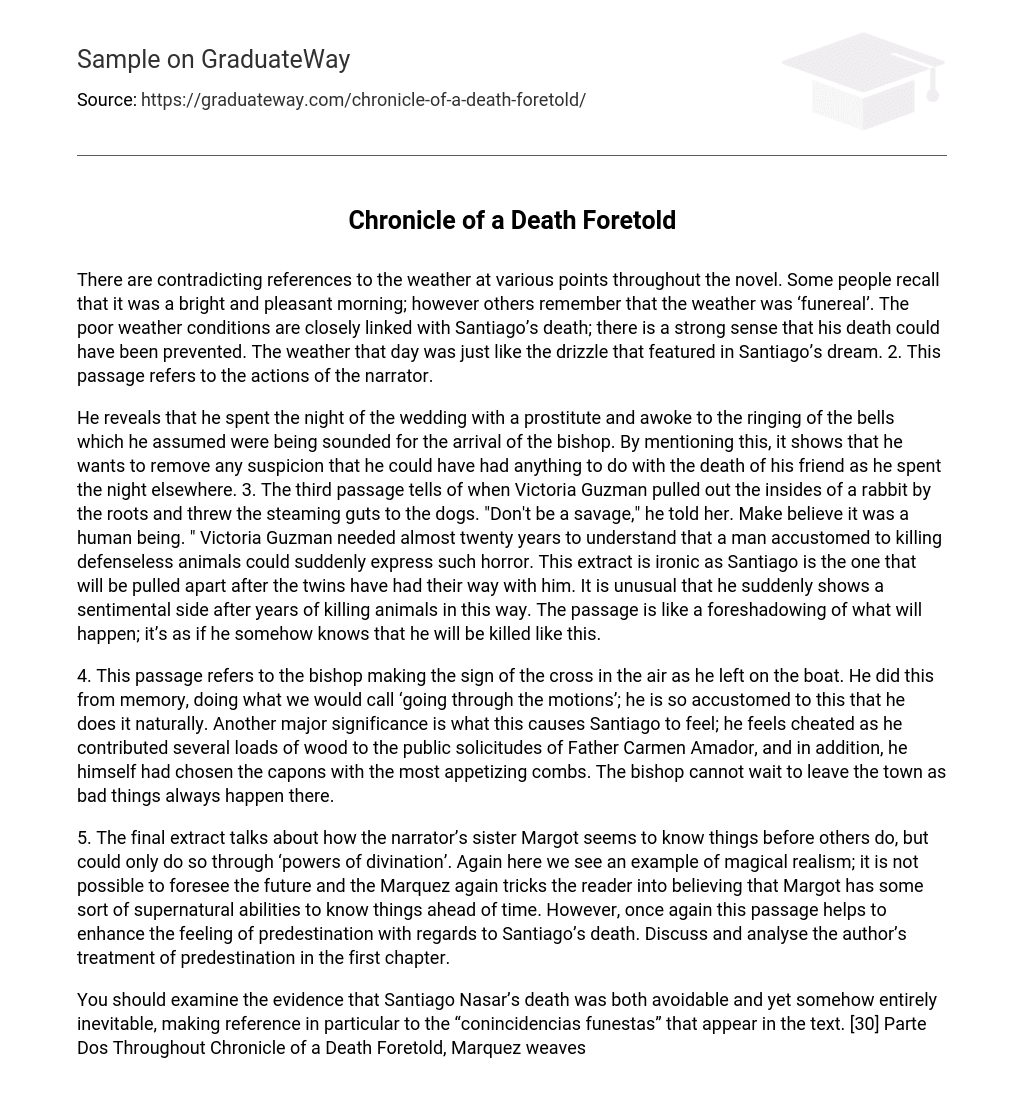There are contradicting references to the weather at various points throughout the novel. Some people recall that it was a bright and pleasant morning; however others remember that the weather was ‘funereal’. The poor weather conditions are closely linked with Santiago’s death; there is a strong sense that his death could have been prevented. The weather that day was just like the drizzle that featured in Santiago’s dream. 2. This passage refers to the actions of the narrator.
He reveals that he spent the night of the wedding with a prostitute and awoke to the ringing of the bells which he assumed were being sounded for the arrival of the bishop. By mentioning this, it shows that he wants to remove any suspicion that he could have had anything to do with the death of his friend as he spent the night elsewhere. 3. The third passage tells of when Victoria Guzman pulled out the insides of a rabbit by the roots and threw the steaming guts to the dogs. “Don’t be a savage,” he told her. Make believe it was a human being. ” Victoria Guzman needed almost twenty years to understand that a man accustomed to killing defenseless animals could suddenly express such horror. This extract is ironic as Santiago is the one that will be pulled apart after the twins have had their way with him. It is unusual that he suddenly shows a sentimental side after years of killing animals in this way. The passage is like a foreshadowing of what will happen; it’s as if he somehow knows that he will be killed like this.
4. This passage refers to the bishop making the sign of the cross in the air as he left on the boat. He did this from memory, doing what we would call ‘going through the motions’; he is so accustomed to this that he does it naturally. Another major significance is what this causes Santiago to feel; he feels cheated as he contributed several loads of wood to the public solicitudes of Father Carmen Amador, and in addition, he himself had chosen the capons with the most appetizing combs. The bishop cannot wait to leave the town as bad things always happen there.
5. The final extract talks about how the narrator’s sister Margot seems to know things before others do, but could only do so through ‘powers of divination’. Again here we see an example of magical realism; it is not possible to foresee the future and the Marquez again tricks the reader into believing that Margot has some sort of supernatural abilities to know things ahead of time. However, once again this passage helps to enhance the feeling of predestination with regards to Santiago’s death. Discuss and analyse the author’s treatment of predestination in the first chapter.
You should examine the evidence that Santiago Nasar’s death was both avoidable and yet somehow entirely inevitable, making reference in particular to the “conincidencias funestas” that appear in the text. [30] Parte Dos Throughout Chronicle of a Death Foretold, Marquez weaves elements of the supernatural. From the dreams that Santiago has the sight before his death to the signs that people note foretelling his death, a sense of an unseen force prevails. For example, Santiago has inherited his “sixth sense” from his mother, Placida. Margot feels “the angel pass by” as she listens to Santiago plan his wedding.
Supernatural intervention pervades all aspects of the characters’ lives. On the morning of his death, Santiago awoke very early and told his mother that he’d had a dream about how happy he was walking through a grove of trees, but when he woke up he felt that he was covered in bird droppings. His mother was known to interpret dreams but didn’t see anything unusual in what he told her. He dreamt about trees a lot, she would later remember. She fails to recognize the significance of Santiago’s dream of birds and trees the night before.
She regrets that she paid more attention to the birds, which signify good health. Trees, on the other hand, are an omen. Another factor which makes the reader think that Santiago’s death could have been prevented is the envelope which he fails to read as he leaves his house in the morning of the arrival of the bishop. If Santiago had seen the envelope he might have been able to prevent his own death. What is interesting is that someone, who was never identified, left this envelope with precise details of how and where and when the conspiracy to kill Santiago was going to be carried out.
I think Marquez includes this to show that someone close to the brothers has recently found out about (/ has been involved all along but has got cold feet at the last minute) their plans to kill Santiago and hence decided to warn him of the twins’ planned murder. There are several other references of his imminent death; for example, the brothers only wake up when Santiago leaves his house; this seems as if all of the events of that day were destined to happen in a particular way.
Moreover, Santiago is also described as ‘already seeming like a ghost’ and there is also a mention of ‘the hand of death’ – Santiago is like a dead-man walking. Similarly, the relevance of the cocks goes back to the time of Jesus where the cocks’ crows signified Judas’ imminent betrayal of Jesus; and here the cocks crow as well; implying that Santiago is about to be murdered. Finally, insomniac sleepwalkers refer to someone doing something without making conscious decisions; which you could argue in this case is Santiago as he cannot control what he does as all of the happenings on that day are destined to occur.





